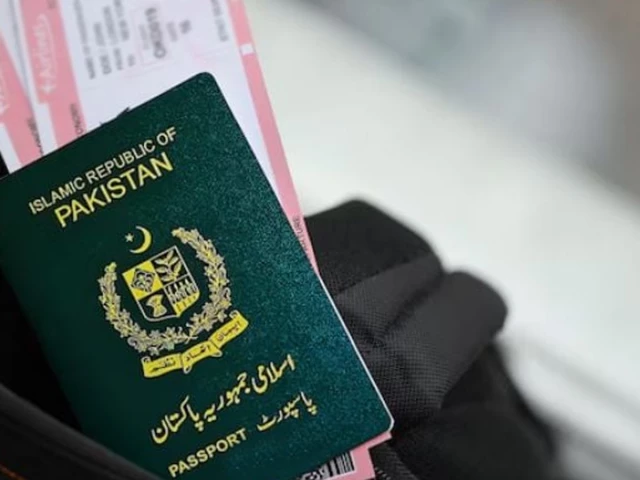For the first time, we fall from the top 10 passports; UK
Pakistani passport has fallen in several places in the latest Henley Passport index, which now ranks 103. Global, tied with Yemen. It now has visa -free access to only 31 countries, a sharp fall from its previous location of 96. When 32 countries granted visa -free access to Pakistani passport owners.
The Henley Passport index, which ranks passports, based on the number of destinations their owners can visit without a previous visa, showed that Pakistan’s attitude has worsened in the midst of rising regional competition.
Iraq is at 104. Position with access to 29 destinations, Syria 105. With 26 destinations and Afghanistan 106th with access to 24 destinations, all sit under Pakistan now in global locations.
This drop places Pakistan among the least powerful passports in the world where fewer countries offer visa -free access. The index highlights a growing difference between the South Asian nation and more globally connected nations.
Indian passport slides to 85. Position
The Indian Passport has also fallen in several places in recent Henley Passport -Index ranking, which falls to 85. Position, tied with Mauritania. Pas now has visa -free access to only 57 countries, a sharp fall from the 77th place it had earlier this year when it had visa -free access to 59 countries.
This decline reflects a shift in global mobility dynamics, where India is now drawing behind several countries with regard to travel freedom. The Indian Passport Fall in the Ranking High Points Continuous Challenges in ensuring greater international access despite the country’s growing global influence.
Singapore tops in global location
Singapore has retained its position as the world’s strongest passport with visa-free access to 193 countries, according to recent Henley Passport Index locations. South Korea and Japan follow closely with visa -free access to 190 and 189 countries respectively.
Germany, Italy, Luxembourg, Spain and Switzerland occupy the fourth place with access to 188 destinations. These European countries remain competitive and reflect strong diplomatic and global relations.
Austria, Belgium, Denmark, Finland, France, Ireland and the Netherlands in the top five, enjoying each visa -free access to 187 destinations. The ranking emphasizes Asia’s growing influence in global mobility, where Singapore’s passport ensures the top position for the fourth consecutive year.
Uk, us fall to historically low
For the first time since the Henley Passport index was created two decades ago, the United States has fallen out of the world’s top 10 most powerful passports. When it was ranked No. 1 in 2014, the US pass now has the 12th position, tied with Malaysia, with visa -free access to only 180 out of 227 countries.
The British passport has the same way fallen to its lowest rank ever and fell from 6th to 8th place since July. Like the United States, Britain once had the top location in the index and achieved first place in 2015.
“The decline in the US passport and its latest fall from 10th to 12th position has been driven by a number of access changes,” Henley & Partners said. “The loss of visa -free access to Brazil in April due to a lack of reciprocity, and the United States was excluded from China’s expanding visa -free list, were the most important factors behind its downward slide.”
The report continued, “Adjustments from Papua New Guinea and Myanmar as well as Somalia’s new Evisa system and Vietnam’s exclusion of the US from its latest visa-free list contributed to the last battle and pushed the United States out of the top 10.”
China is rising in global pass ranking
China has been one of the biggest climbers in IIndex in the last decade and jumped from 94th place in 2015 to 64. In 2025. This increase reflects a significant improvement in the country’s visa -free access, which has increased by 37 destinations during this period.
“The latest developments, including the award of visa -free access to Russia, emphasize Peking’s ongoing strategy for increased openness,” Henley & Partners said in their report. “China’s movements with new agreements with the Gulf States, South America and several European countries cementing its role as a global mobility force center that strengthens the Asia-Pacific region’s dominance in travel freedom.”
This increase emphasizes China’s growing diplomatic influence and its strategic efforts to improve the travel freedom of its citizens. The country’s increasing connection is strengthening its position in global mobility, especially in the Asia-Stolshav area.



